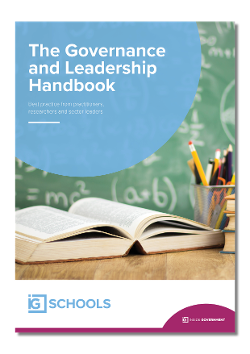School Governance and COVID-19: Future Challenges
With COVID-19 presenting a myriad of challenges and opportunities for the education sector, David Walker, Governance Professional and Trustee, reflects on what the impact of the pandemic may mean for school governance moving forward.
I think we can all agree that the last 18 months have brought unprecedented challenges to our education system. One can only stand back in awe and admire the way in which schools have risen to the many challenges posed by the pandemic and ensured that pupils continued to remain at the heart of what they were doing. Schools became adept at responding to rapid change as evidenced in their agile responses to the demands of, for example, remote learning and the various changes to the provision of free school meals, whilst having to keep an eye on the almost daily updates from the DfE. The requirements of navigating these issues have highlighted the importance of good governance and, throughout the pandemic, those involved in the governance of our schools continued to play an active role in supporting schools.
Now that we appear to have entered a stretch of calmer water, it is appropriate to reflect on the experiences of the past year and use the lessons learned to ensure that our governance system is one which is fit for purpose and sustainable into the future. The pandemic has asked questions of our governance processes and systems and had an impact on the relationship between schools and those who support the governance of our schools. It is now appropriate to look again at those systems and processes that, until recently, were perhaps taken for granted as “the right way to do things”.
Governing boards responded to the pandemic in a variety of ways but, from my viewpoint, most boards adopted a blended approach to ensuring that governance continued despite the challenges that the pandemic posed to their ongoing work. Boards appear to have taken the opportunity to “do things differently” but I think this has been more related to the efficiency of governance rather than the effectiveness of governance. The opportunity provided by technology to maintain contact at all levels was generally seized by boards and most boards maintained the rhythm of the regular business meeting. Much harder, though, was to maintain the activity linked to the strategic aspects of the governance role. I think the first lockdown did see a real pulling back in relation to this but the second lockdown appeared to generate renewed activity around this given the way that remote learning had come to the fore and enabled the majority of pupils to access learning. Boards talked, for example, about monitoring the impact of remote learning but I think the reality was that activity was related to finding out about remote learning rather than evaluating any impact that it might be happening.
I think this latter point in relation to monitoring also rings true pre-Covid and the greet challenge to my mind as we move forwards is how governance will re-connect with those aspects of schools that should really drive governance activity, particularly when the relationship between schools and governors has, through necessity, been reshaped over the last 12 months. This reshaping of the relationship can be seen in the way that activity during the pandemic was often reduced to interaction between a very small group of governors and the Head Teacher. This almost led to the development of a “Cabinet-style” model of governance where two or three governors became, by default, the voice for the Board. The upside of this was that activity was maintained but at the cost perhaps of the collective view.
As we now move forward we must use our experience of the last 12 months to inform what we want our governance systems and processes to look like into the future. The Competency Framework is approaching its fifth birthday so an evaluation of its impact on the understanding and skills of governors by the DfE should be considered. It was launched with the tantalising glimpse of funded training for governors but this is something that we continue to discuss but is still left to the interest and inclination of individual governors. Perhaps it is time to get serious about funding the development of those we seek to make accountable for the efforts of our schools?
There will be lessons to be learned about the ways in which governance adapted and developed through the pandemic but in searching for new and different ways to do things, we must always remember that the easy part is getting the new ideas in, the hard part is getting the old ideas out.
Read more about approaches to leadership and governance in the Governance and Leadership Handbook, available for download below.



%20(1).png)
